OREGON TILTH
GROWTH AND IMPACT REPORT

Celebrating 50 Years of Advancing Organic Agriculture through Leadership, Collaboration, and Innovation














Celebrating 50 Years of Advancing Organic Agriculture through Leadership, Collaboration, and Innovation












We do the right thing, no matter what. We are of good character. We grow trust through honesty, consistent care and attention.
We share our beliefs, decisions, strengths and failures. We are vulnerable and aim for authenticity. We are open and honest, even when things are unclear or unknown.
We live with a purpose to make a difference for others. We seek to understand the thoughts and feelings of others. We are generous of heart.
We believe everything is interconnected. We work towards balance, support and the well-being of all life
– human, plant and animal. We honor differences and value diversity as the bedrock of resilience.
We pursue new ideas and innovation in service to a greater good. We transform hope into influence and solutions. We are eager learners and enthusiastic educators, sharing know-how with others to encourage continuous improvement.
We see collaboration with others as a roadmap to success. We celebrate each other’s uniqueness. We build solid, lasting relationships. We each do our part.
We turn our beliefs and values into concrete action. We see challenges as opportunities. We face difficult tasks and conversations rather than avoiding them.
Ani Kame’enui, President
Tina Consentino, Treasurer
Tinia Pina, Secretary

Alisha Burrell, Member
Poppy Davis, Member
Channing Nesbitt, Member
Erin Silva, Member
Chris Schreiner, CEO
Kim Nelson, People and Culture Director
Edward Johnson, Communications and Marketing Director
Leonard Freeman, Jr., COO
Renee Kempka, Finance and Administration Director
Heather Smith, IT Director
OUR MISSION
Support and promote biologically sound and socially equitable agriculture.
OUR VISION
Community-led food systems that enrich people and planet, together.
Pictured above: Oregon Tilth Board of Directors, Executive Leadership members, and Paul Quinn College students discuss organic agriculture on the WE Over Me Farm in Dallas, Texas










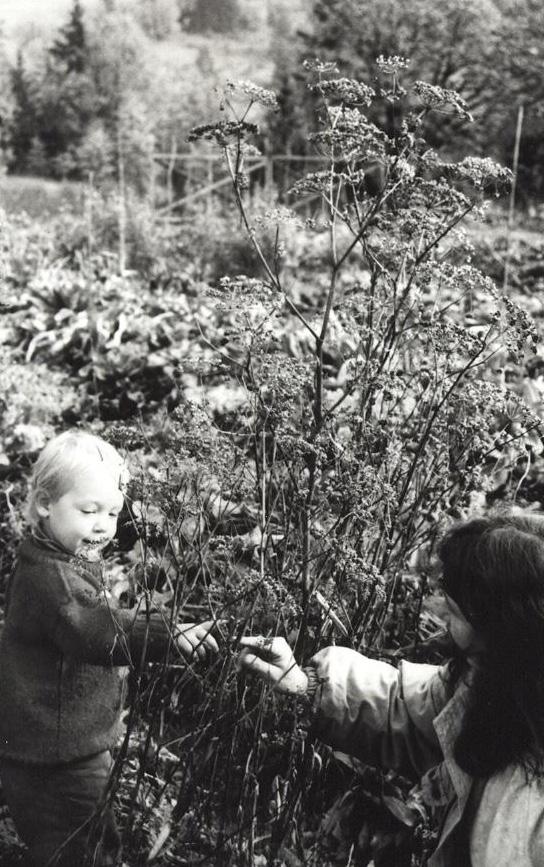














Inspired by farmerpoet Wendell Berry’s appeal to “enhance and embolden the possibility of strong agricultural communities,” Tilth was founded to promote a sustainable and just food system.

Oregon Tilth enters into a longterm agreement with the Natural Resources Conservation Service (NRCS) to provide training and technical assistance.

Oregon Tilth formally incorporated as a non-profit organization.

Oregon Tilth plays a key role in advocating for the Organic Foods Production Act, which becomes part of the 1990 Farm Bill.

Oregon Tilth established a Mexico branch office with a physical location in the country. Continuing to offer organic certification under Mexico Organic Standards (LPO).

Oregon Tilth publishes “Breaking New Ground: Farmer Perspectives on Organic Transition,” a key report that informs future USDA investments in organic support.

Oregon Tilth expands its certification services beyond Oregon, gaining recognition as a leader in organic certification standards in the U.S. and internationally.

Oregon Tilth restructures its service delivery model to improve efficiency and scalability, transitioning to a team-based model to better serve clients and stakeholders.

Oregon Tilth becomes one of the first USDAaccredited organic certifying agents under the newly established National Organic Program (NOP).


USDA’s National Organic Program, Transition to Organic Partnership Program (TOPP), establishes new partnerships and mentorship opportunities for transitioning organic producers across the U.S.

The USDA National Organic Program officially launches, and Oregon Tilth becomes a key certifier under the new federal regulations.

Oregon Tilth partners with the Accredited Certifiers Association (ACA) to enhance collaboration and consistency among organic certifiers in the U.S.

2023
Oregon Tilth implements the Strengthening Organic Enforcement (SOE) rule, collaborating with the USDA to ensure greater integrity and compliance within the organic industry.
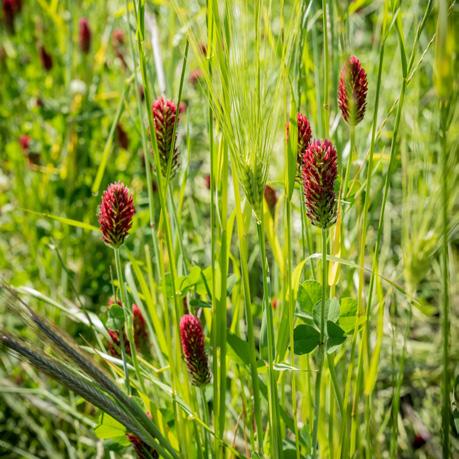
Oregon Tilth expands its partnership with the NRCS to establish a new national agreement, increasing the number of organic specialists.
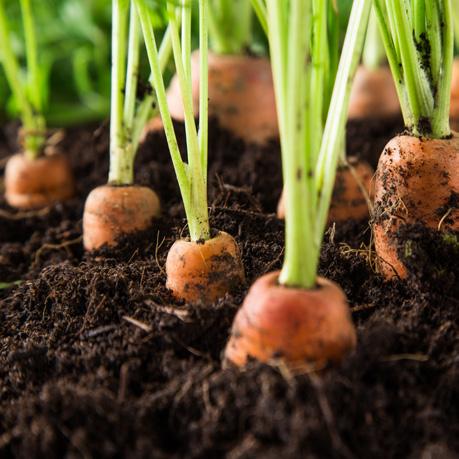
Oregon Tilth co-founds the Organicology conference, bringing together diverse stakeholders in the organic agriculture movement.

Oregon Tilth celebrates its 50th anniversary, reflecting on its legacy of leadership, innovation, and collaboration in the organic movement.
50 Years of Growth and Collaboration


As we celebrate Oregon Tilth’s 50th anniversary, I am honored to reflect on the remarkable journey that has brought us to this milestone. Over the past five decades, Oregon Tilth has grown from a passionate group of organic visionaries into a leading organization dedicated to advancing organic agriculture, education, advocacy, and certification. We are here today because of the tireless efforts and commitment of so many—our staff, clients, partners, and stakeholders—who believe in the transformative power of organic.
This year’s Growth and Impact report reflects our legacy of leadership, innovation, and collaboration, values that have defined our path and will continue to guide us. As highlighted in this report by our CEO, Chris Schreiner, and our COO, Leonard Freeman, Jr., we remain committed to innovation and forward-thinking strategies. By embracing technological advancements and data-driven approaches, we ensure Oregon Tilth remains agile and responsive to the evolving needs of our community, empowering both producers and consumers to make informed choices.
At the heart of our organization lies a deep commitment to education and advocacy. For 50 years, we have been educators—sharing knowledge, inspiring change, and fostering biologically sound and socially equitable agriculture for all. Our work in certification has been foundational, providing the assurance that organic standards are upheld with integrity and transparency.
Oregon Tilth is more than an organization; it is a movement built on trust, partnership, and a shared belief in the potential of organic agriculture to create meaningful change.
Thank you for being part of our journey. We are grateful for your support, dedication, and shared belief in our vision. Here’s to the next 50 years of growth, collaboration, and impact.
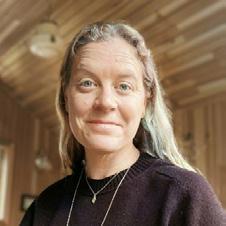
Ani Kame’enui Board of Directors, President


As Oregon Tilth celebrates 50 years, we reflect on our legacy and look ahead with renewed commitment to shaping the future of organic agriculture. Our history is rooted in leadership, innovation, and collaboration—values that continue to drive us forward. For over five decades, we have not only witnessed but actively shaped the evolution of the organic movement, adapting to meet new challenges and seizing opportunities that come our way.
A key theme that resonates throughout our journey is adaptability. Oregon Tilth today is vastly different from what it was 50 years ago, and that’s a strength. We have always embraced change, evolving to meet the needs of the organic community. From shaping organic standards and practices to expanding geographically into new regions, our adaptability has allowed us to stay ahead. Our recent work with initiatives like the Strengthening Organic Enforcement (SOE) and the Transition to Organic Partnership Program (TOPP) showcases our leadership in creating resilient, sustainable systems.
One of the most memorable aspects of our journey has been our ability to bring together diverse voices and build bridges within the agricultural community. From the early days of Organicology conferences to our ongoing partnerships with land-grant universities, state departments, and federal agencies like the USDA NOP and NRCS, we have consistently sought to foster collaboration. These relationships allow us to align resources, share knowledge, and work together toward a common goal—creating a sustainable, inclusive food system.
Our commitment to inclusivity remains at the forefront of our vision. Organic should be accessible to everyone, from consumers seeking healthier options to producers transitioning their farms and facilities. We strive to make organic certification more inclusive, affordable, and aligned with the diverse needs of communities. We continue to expand our reach and support underrepresented voices in the organic sector, believing that our collective strength lies in our diversity.
Looking ahead, we remain dedicated to promoting the positive impacts of organic farming, beyond simply what we prohibit. We champion healthy soils, biodiversity, safe working conditions, and economic viability for farmers and food businesses. As we navigate the next 50 years, we are committed to nurturing a community that values connection, innovation, and the shared mission of fostering a more sustainable world.
Thank you for being part of our journey. Together, we will continue to lead, innovate, and inspire the organic movement.

Chris Schreiner CEO



“Inspectors are the face of the certifying body,” says Kurt. “We’re technically guests at an operation, enacting a third-party verification service. It’s a fine line to walk, and I have the great joy of supporting those who do this important work every day.”
“I remember being impressed by the organic inspector’s vast knowledge,” Rose recalls. “That interaction inspired my career in organic regulation. I became passionate about sustainable agriculture, realizing that these practices are key to living in harmony with nature.”

Watch the “Become an Organic Inspector” Video

Organic inspectors and certification reviewers play a pivotal role in safeguarding the integrity of organic standards, ensuring that farms and businesses comply with federal guidelines. Through evaluations and audits, these professionals protect consumer trust in organic products, prevent fraud, and promote sustainable, environmentally friendly agricultural practices. Recognizing and elevating the significance of their work within the organic industry is crucial.
Becoming an organic inspector requires specialized training in agricultural practices, regulatory standards, and certification processes. Kurt Belser, Inspections Deputy Director at Oregon Tilth, began his journey to organic farming, which was shaped by his deep connection to agriculture. He studied farm systems and their surrounding social structures before hitchhiking across the U.S., working on various farms. Eventually, he bought and established his own farm.
Despite his background, Kurt didn’t initially consider a career in organic certification. “I often say many of us in this industry fall backward into our positions. I’d like to see more access to these professions and a greater diversity of backgrounds to support the work we do.” Kurt is committed to supporting the next generation of organic inspectors. “On a weekly basis, I have conversations with potential inspectors. Finding a mentor, shadowing them, and developing both practical and soft skills are essential in this profession.”
After several years as an inspector, Kurt now oversees the inspections department at Oregon Tilth. For Kurt, organic certification is the agricultural gold standard. “We’ve set a foundation for others to build upon, but it’s important that we continue to evolve and improve,” he notes.
Rose Petros, a Certification Officer at Oregon Tilth on the Orange Team, shares Kurt’s passion for organic certification. With over six years of experience in food processing, food safety, and quality assurance, Rose is adept at reviewing complex systems. Before joining OTCO, she worked as a Food Safety and Quality Assurance Supervisor, representing her past company during organic inspections.
A typical day for Rose as a reviewer varies. “Some days I’m walking a new handler through the steps of setting up an Organic System Plan (OSP) during an initial review. Other days, I’m combing through an inspection report during a final review, making sure our seasoned clients are following organic regulations.”
Rose’s introduction to agriculture began with her parents, who started a garden and hobby poultry farm to supplement their family’s food supply. “I loved raising animals, and that passion grew into a 4-H project and later into a college education in agriculture.”
With a degree in Animal Science and a minor in Poultry Management, Rose brings a deep understanding of both animal agriculture and food processing. “My favorite part of being a reviewer is helping people who have strayed from organic regulations and steering them back into compliance,” Rose says. “It’s rewarding to share knowledge and ensure the integrity of our organic food supply.”

Oregon Tilth Stories of Resilience, Innovation, and Sustainability in Organic Agriculture




Winsmuir Farm’s
Organic Journey

Name: Winsmuir Farm
Years Certified: 25 Location: Sixes, OR Scope: Crop Crops Grown: Cranberries
Nestled on the rugged Oregon Coast, Winsmuir Farm stands as a testament to resilience and innovation, being one of the few organic cranberry growers in the region.
When the farm began its journey over 25 years ago, the challenges were immense. At that time, there was a scarcity of technical support or advice tailored for organic cranberry farming. But like many trailblazers in organic agriculture, Winsmuir Farm took these challenges in stride, creating new methods for weed control, harvest, and post-harvest processing. Even after more than two decades, the farm continues to refine and improve its systems, embodying the spirit of continuous learning and adaptation.
The decision to embrace organic farming was rooted in a deep sense of responsibility.
For the founders of Winsmuir Farm, growing organic wasn’t just a business choice; it was “the right thing to do.” They aimed to set an example of integrity for their grandchildren, ensuring their farming practices aligned with their values. In recent years, the farm has scaled back its marketing efforts, now focusing on one wholesale buyer and a loyal local customer base. Despite these changes, Winsmuir Farm continues to supply organic cranberries to natural food stores across Oregon.
Today, the farm is owned and operated by one woman, Mary Margaret Smith. Winsmuir Farm was the postretirement dream of Mary Margaret’s late husband, David, who envisioned a life of purpose and fulfillment through farming. Now, 25 years later, Mary Margaret continues to carry that dream forward single-handedly. For her, tending the cranberry bog is more than just work; it’s a source of purpose and pride, knowing she’s providing high-quality, organic food for her community.
Mary Margaret’s journey is a powerful example of perseverance and dedication.

Her advice to new growers reflects the wisdom of her experience: do as much research and investigation as possible before diving into a new venture. While the road ahead may still require improvisation and problem-solving, a foundation of knowledge can provide a clearer path.
Winsmuir Farm’s story is a narrative of legacy, commitment, and the belief in doing what’s right, no matter the challenges.
Strictly Medicinal’s Organic Revolution

Name: Strictly Medicinal
Years Certified: 30
Location: Williams, OR
Scope: Crop, Handling
Crops Grown: Vegetable and Medicinal Herb Seeds
In the heart of Oregon’s Applegate Valley, Strictly Medicinal represents tradition, innovation, and heartfelt dedication to the world of medicinal herbs.
What began over 35 years ago as a seed growing operation by the Cech family has blossomed into a multifaceted enterprise that supplies seeds, nursery stock, herbal medicine-making equipment, and even self-published works.
With offerings that range from arnica to yucca, Strictly Medicinal has become an essential and beloved supplier within the medicinal herb community, extending its influence far beyond its small town.
The mission of Strictly Medicinal is succinct yet profound: “sowing seeds worldwide for the benefits of people, plants, and the planet.” This guiding principle drives their advocacy for seed saving and the preservation of heirloom varieties, ensuring that the richness of plant heritage continues for future generations.
The Cech family believes deeply in the self-sufficiency that comes with growing your own herbal medicine, empowering individuals to take control of their health through nature’s remedies.
Visiting the Strictly Medicinal farm feels like stepping into the dreamscape of the Cech family, where every detail reflects their passion and commitment. Founders, Richo and Mayche Cech have imprinted their very souls onto the business, creating an operation that might seem like a wildly successful hobby at first glance, but in reality, has a profound impact both nationally and internationally.

Their seed catalog, filled with hand-drawn illustrations by Sena Cech and interspersed with Richo’s stories and anecdotes, encapsulates the spirit of Strictly Medicinal—a family affair, meticulously crafted with care, creativity, and a vibrant spirit often missing in the modern industry.
Strictly Medicinal isn’t just a business; it’s a living, breathing entity that reflects the values, dreams, and dedication of the Cech family.
Their story is one of passion turned into purpose, and their farm in the Applegate Valley remains a place where seeds are sown not just into the soil, but into the hearts and minds of people around the world.

Name: Pacific Botanicals
Years Certified: 40
Location: Grants Pass, OR
Scope: Crop
Crops Grown: Herbs
Located in the fertile lands of Southern Oregon, Pacific Botanicals, affectionately known as “PacBot” by its farmers, stands as one of the pioneering herb growing operations in the United States. What began over 40 years ago as an independent venture has since evolved into a vital subsidiary of the well-known herbal product company Herb Pharm.
Today, many of the herbs cultivated at Pacific Botanicals are transformed directly into Herb Pharm’s tinctures, which can be found on store shelves across the nation. This seamless integration of farming and product manufacturing is a prime example of vertical integration, a practice that is becoming increasingly rare in our globalized world. The remainder of PacBot’s herbs are sold wholesale to other natural product companies, making the farm a cornerstone of the herbal community. In this wholesale business they sell more than 280 herbal products, in forms ranging from cut leaf & powder to whole seeds, flowers, and berries.
In recent years, Herb Pharm and PacBot have embarked on a journey toward creating a closed-loop, regenerative agricultural system. They have shifted their focus to growing a wider variety of herbs for their own products, reducing reliance on overseas markets. These farms have largely become self-sufficient, producing their own compost and relying heavily on cover cropping to enrich the soil. They have also embraced agroforestry, cultivating at-risk plants with great care, ensuring they are harvested sparingly to protect their future. Beyond these sustainable practices, Herb Pharm & PacBot are committed to seeding their local communities. As the parent company of PacBot, Herb Pharm’s flagship farm opens its doors for local events and has established a renowned internship program that trains the next generation of herbalists and farmers, ensuring that their knowledge and passion are passed on.

As PacBot marks 40 years of organic certification, their focus is on the future.
Mark Disharoon, Farm Manager and Matt Dybala, Director of Agricultural Operations at Herb Pharm, are committed to leaving a lasting legacy through sustainable land management, pollinator habitats, and farmer education. At PacBot and Herb Pharm, sustainability is a way of life, guided by the belief that thinking long-term and loving what you do leads to success.
Pacific Botanicals is a testament to the values of sustainability, education, and community.
As they continue to cultivate both the land and the future of herbal therapeutics , their legacy is one that will resonate for generations to come.

The Natural Resources Conservation Service’s Commitment to Expanding Support for Organic Producers




Oregon Tilth Partnership with the Natural Resources Conservation Service

U.S. Department of Agriculture, USDA, Natural Resources Conservation Service, NRCS, Resource Unit Conservationist
The Natural Resources Conservation Service (NRCS) is making historic new investments in support for organic producers, by expanding their 14-year contribution agreement with Oregon Tilth, and establishing a new state-level agreement to provide direct conservation technical assistance to organic and transitioning producers in Oregon.
Since 2010, Oregon Tilth has held an agreement with NRCS to provide training, technical assistance, and resources focused on organic systems for staff of the federal agency. This work supports staff’s increased knowledge of organic practices and greater comfort level in working with organic producers to meet their conservation goals. By strengthening conservation on organic farms, these efforts contribute to Oregon Tilth’s mission to shape a more sustainable food system.
Expanding on the historical impact of our work with NRCS, this new national agreement will establish six regional organic specialists across the country, in partnership with California Certified Organic Farmers (CCOF) Foundation, Marbleseed, and Organic Agronomy Training Service (OATS). By greatly increasing our capacity to provide this training and assistance for NRCS staff, more organic and transitioning producers will be able to access conservation programs. This investment aligns with increased USDA support for transitioning and organic producers through the Organic Transition Initiative, representing industry-wide recognition for challenges producers face and assistance needed during the transition to organic and once certified.
Additionally, Oregon Tilth is establishing a new agreement with Oregon NRCS, to provide direct conservation technical assistance to organic and transitioning producers.



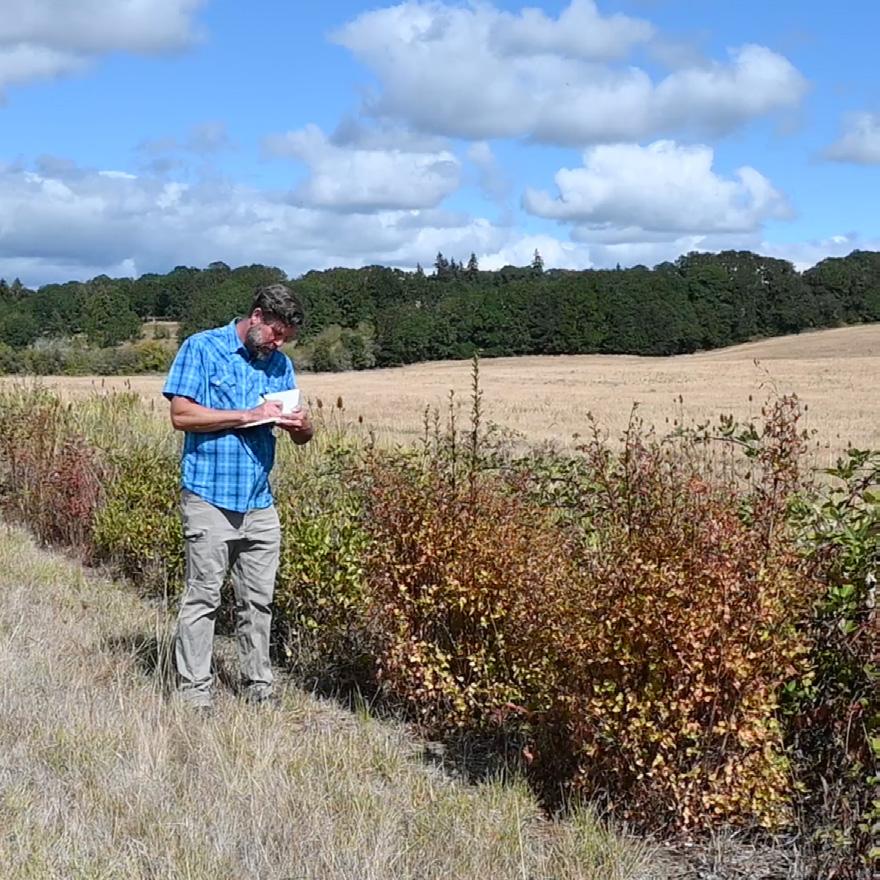
The goals of this agreement are to build NRCS capacity to support these producers through conservation programming, help producers implement practices that improve soil health and mitigate climate change, and increase access to NRCS programming for Historically Underserved, Beginning, and Socially Disadvantaged organic and transitioning producers.
We are thrilled to leverage these opportunities to expand on our longstanding relationship with NRCS, and excited to share the continued impact of our work.


Conservation Impact by the Numbers
NRCS awards $5 million to Oregon Tilth and Organic Farming Research Foundation to expand organic expertise and support.
Oregon Tilth to establish six regional organic specialists across the U.S. for hands-on training and support.
Boosted funding for conservation programs through the Organic Transition Initiative and Inflation Reduction Act.

Producers can access education, workshops, and expert mentorship through a new flexible organic management standard.
Oregon Tilth and Organic Farming Research Foundation join NRCS’s Organic Transition Initiative for five years.


ORGANIC FOSTERS
HEALTHY ECOSYSTEMS
Organic soils store 13% more carbon than conventional soils, making organic farming an important player in combating climate change.
Organic crops contain 48% less cadmium, a toxic heavy metal, compared to conventionally grown crops.
Organic farming improves soil structure and water retention, which reduces the need for irrigation and prevents soil erosion.
Leverage the support of our Applicant Experience Team from the start. They’re here to guide you through every step of the certification process.
After applying, meet your review team, seasoned in your field, who will provide expert guidance for your specific needs.
Prepare for inspection by working with your Applicant Experience Team and Review Team for checklists, document preparation, and audit tips.
Organic farms use up to 45% less energy than conventional farms and emit less greenhouse gases.
INSIGHTS FOR ORGANIC CERTIFICATION SUCCESS THROUGH OREGON TILTH 88% OF CLIENTS MAINTAIN CERTIFICATION WITH OREGON TILTH FOR MORE THAN 1 YEAR
YOUR FEEDBACK MATTERS
We listen. Reach out with feedback to help us improve and ensure you’re supported. Contact us at getcertified@tilth.org or call us directly at 503-378-0690.
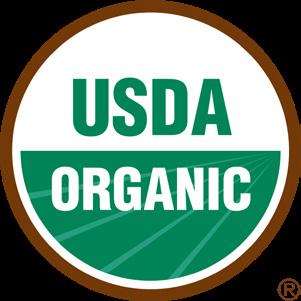
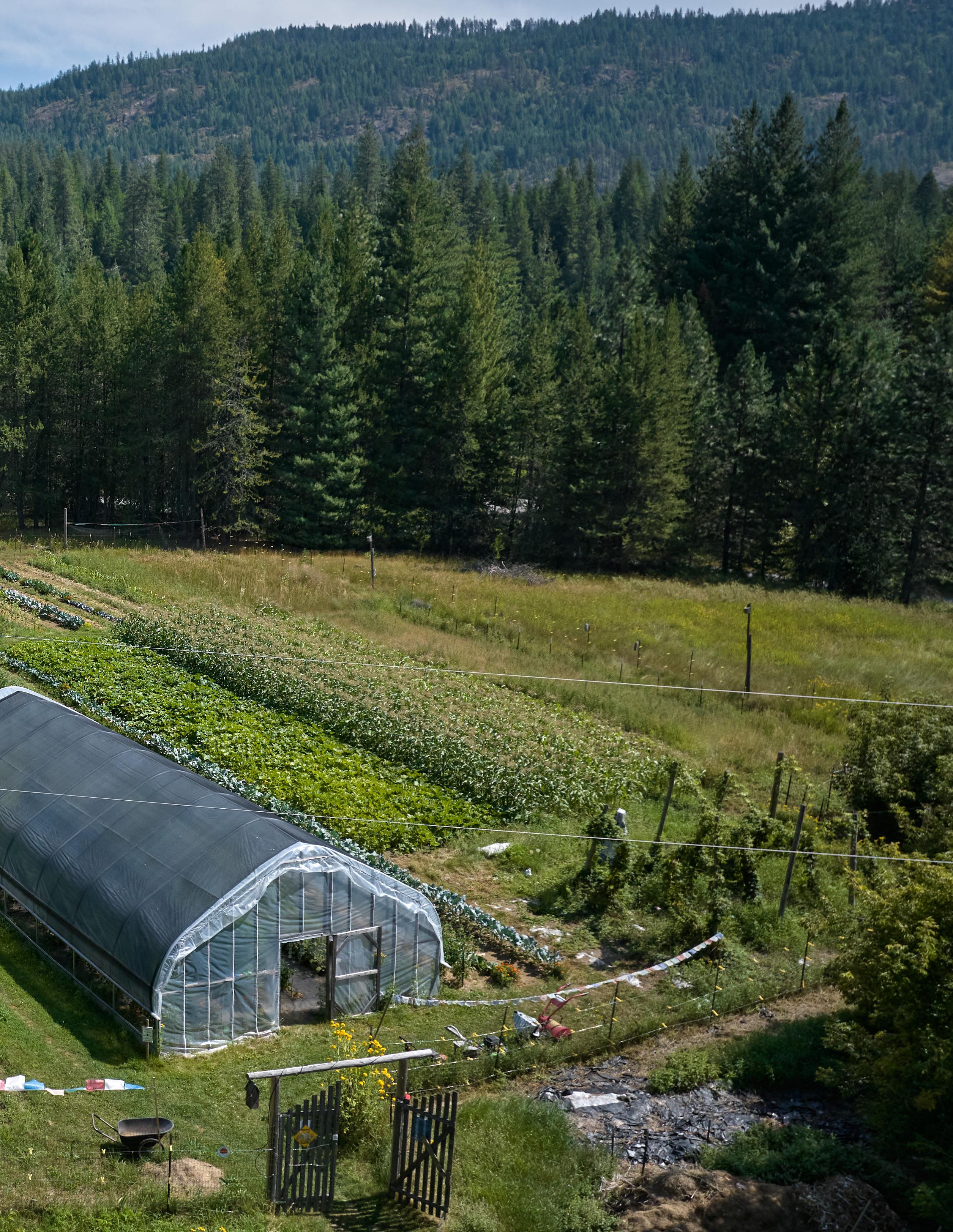
FEDERALLY GUARANTEED AND TRACEABLE FROM THE FARM TO TABLE.
are plants that are grown for the purpose of covering the soil, rather than for traditional harvest, and can provide benefits of managing erosion, protecting water quality, improving soil health, providing soil fertility, enhancing biodiversity, and controlling weeds, pests, and disease.
CROP ROTATION, or varying the crops grown in each field, can disrupt pest life-cycles, increase soil organic matter content, and reduce erosion.
BUFFER ZONES, can provide opportunities to enhance biodiversity and provide wildlife habitat.

PRACTICES ARE RESILIENT
PROTECTS BIODIVERSITY
USES AROUND 50% LESS NEW REACTIVE NITROGEN
IS PART OF THE SOLUTION TO CLIMATE CHANGE
REGENERATES SOIL HEALTH
PROTECTS NATURAL RESOURCES
SUPPORTS HUMAN HEALTH
ENCOURAGES ANIMAL HEALTH AND WELFARE
ORGANIC FARMS
HAVE 30% MORE SPECIES
SUPPORT UP TO 50% MORE POLLINATORS
SEQUESTER 26% MORE CARBON
HAVE MORE SIGNIFICANT BIOLOGICAL ACTIVITY, GREATER SOIL STABILITY, MORE BIOMASS AND HIGHER DIVERSITY. TILTH.ORG

Supporting transitioning and organic producers with mentorship and resources through the Northwest Transition to Organic Partnership Program (NW TOPP) assembled by the USDA National Organic Program





Listen and watch this collection of NW TOPP stories and more.





“The thought processes is that if you have a mentor, a lot of these people that are sitting on the fence of being organic certified will actually take the steps forward to be organic certified. And it’s a great little program because your farmer doesn’t have to pay for a mentor, but yet, your mentor gets compensated for the time that they put into it,” said Dan.

In the northwest corner of the Willamette Valley, longtime friends Dan Rinke and Perry Heistuman can be found discussing the ripeness of wine grapes amongst 20 acres under vine. Their friendship has deepened through their formal mentorship established under the Northwest Transition to Organic Partnership Program, where Dan guides Perry in the journey toward organic certification.
Dan has grown fruit and wine grapes in Oregon’s Willamette Valley the last 17 years. In 2002, he recognized the importance of organic farming. For him, the organic certification wasn’t just a label—it was a badge of credibility. “It’s a way of having a third party validate that I’m actually doing what I say I’m doing,” Dan explains. Over the years, he has navigated the certification process with care and precision, growing more attuned to the rhythms of nature and the demands of organic farming.
As a recent viticulture graduate, Perry found herself overwhelmed by the technicalities of organic practices and the certification requirements. “I was flailing,” she admits. She needed more than just textbooks and guidelines—she needed someone to ask the simple but pressing questions to. So, when Perry approached Dan last year seeking guidance on the organic certification process, Dan suggested the mentorship program under the Northwest Transition to Organic Partnership Program (TOPP). The program offers Perry the support she desperately needed and compensates Dan for his time and knowledge.
With Dan’s expertise just a text away, Perry finally found the clarity and confidence she was looking for. “Even yesterday, I could just text him and ask if it was too late in the season for a fungicide. He got back to me right away,” she recalls.

For Dan, formally mentoring Perry has been just as rewarding. “One of the reasons I wanted to be a mentor is because I have friends who were in the same place I was 15 years ago—fumbling through the process, with no one to turn to. I would’ve loved to have had a mentor back then,” he reflects.
Through the mentorship, Dan not only passes on his knowledge but also nurtures the next generation of organic growers.
Berkey’s Blueberries Organic Journey


MENTOR & MENTEE STORY
Berkey’s family spends time together picking blueberries on their certified organic family-owned farm.
On the banks of the South Santiam River, in Lebanon, Oregon, Jesse Berkey and his family farm organic blueberries at Berkey’s Blueberries. “We established our farm in 2007 and it has been organic from day one,” Jesse explains.
The Berkeys pursued organic certification to protect the river’s water quality, encourage biodiversity, and support a healthy ecosystem for pollinators—all while avoiding the environmental and personal health risks of chemical sprays and carcinogens. Jesse also sees organic certification as a valuable asset to the business, ensuring trust between farmer and consumer.
Jesse joined the Transition to Organic Partnership Program mentorship program as a mentor to give back. Jesse understands that the tasks of the certification process and the recordkeeping requirements can be a barrier to entry for many farmers. The mentorship program lessens that burden for transitioning farmers learning the ins and outs of organic.
“I want others to know that there’s help available and it can be done, and for those that are choosing and are considering it, then having a mentor and mentee relationship can definitely improve the process,” said Jesse.
Jesse says mentees should consider joining the program for the opportunity to gain experience from somebody that has already been through the trenches. To better understand the paperwork requirements, Jesse invited his mentee to observe him fill out logs in preparation for his annual audit. So the two plan to meet via Zoom while Jesse shows how to do the paperwork.
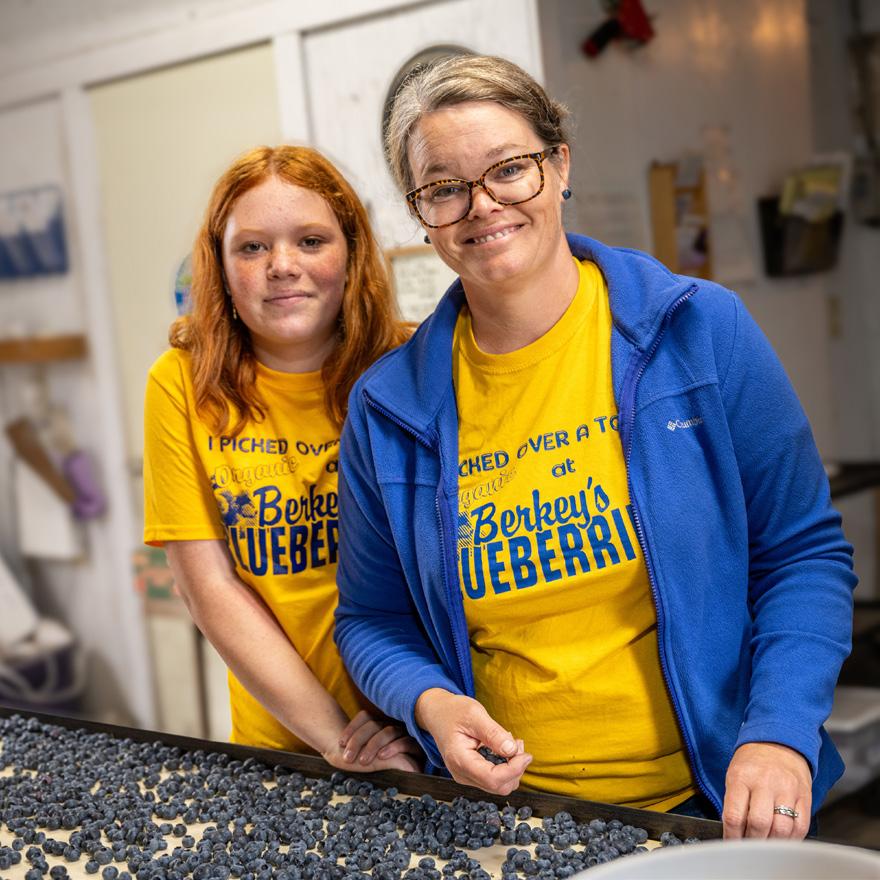
“I’ll show him the logs, how we fill them out, how we prepare, and what it takes, so that he’ll be prepared when he goes through his first inspection and begins his process,” said Jesse, “Again, it is a tool that wasn’t available to myself - we were scratching and clawing to create forms and figure out a process in the beginning. It just could have been better, and so I want to impart that on others. With a program like this, it is better, and can make the certification process feel less daunting. I wish I had this help when I started.”


“I thought that certification was something that wasn’t an option for me because I was so small,” Anuschka said, “there’s a lot of misinformation out there about how much it costs, how difficult it is, that I didn’t think it was something that was realistic for me. But once my mentor educated me about the fact that it was something that was achievable for someone on my scale, then I really understood that not only was I going to be able to produce food that was good for me and my family, but was also going to be something that I could present to my customers that they could trust.”
Diane Green has been at the forefront of organic farming in Northern Idaho for over three decades. As the founder of Greentree Naturals, an organic farm certified in 1992, she has dedicated her life to growing diverse crops and educating the next generation of farmers. Located in the Panhandle near the Canadian border, Diane’s farm produces over 130 varieties of vegetables, with an unwavering commitment to organic practices that support the local food system.
Her role as a mentor through the Transition to Organic Partnership Program (TOPP) exemplifies her passion for nurturing new farmers. “Mentoring is kind of like planting a seed and watching it grow,” Diane shares.
With years of hands-on experience, she takes pride in guiding mentees through the complexities of organic certification, from recordkeeping to soil health management. For her, it’s about empowering farmers with the tools and knowledge they need to succeed, strengthening Idaho’s organic farming landscape in the process.
By mentoring new farmers who embrace organic methods, Diane is contributing to the organic movement’s larger goals of promoting biodiversity, improving soil health, and fostering long-term sustainability. One of these new farmer mentees is Anuschka Bales, who is starting her own small-scale diversified vegetable farm, Bobcat Farm, down the road from Diane. Anuschka has approximately 300 varieties of fruits and vegetables growing. The two met at a workshop Diane hosted, and Diane recommended for Anuschka to become a mentee with TOPP. Anuschka is looking towards organic certification in a year or two, and while she’s on the path to certification, she’s receiving guidance from her mentor on organic recordkeeping systems, crops, soil health, inputs and more.

For Anuschka, the access to knowledge that has come with the TOPP has removed the fear and trepidation that came with the obstacle of certification. “Having a mentor that you could reach out to that’s available to answer the small questions and the big questions and to really lay out the path forward really takes a lot of the fear out of that and empowers you to say that, yes, you can do this has been good,” Anuschka said.
For Diane, mentorship isn’t just teaching—it’s about building the future of organic farming one mentee at a time. “One of the greatest values of being a mentor is the ability to see ahead, share your experiences, and help others navigate a path to their destination,” Diane explains.


sustainable ranching practices, ensuring healthy soil and resilient livestock through organic and regenerative methods.
In the heart of central Montana, at the base of the Crazy Mountains, Mihail Kennedy has been working for over a decade at B Bar Ranch. Spanning 7,000 acres, the historic 1906 B Bar Ranch raises certified organic grass-fed and finished beef, embodying a commitment to regenerative agriculture and ecological stewardship.
For Mihail, organic farming is about more than just avoiding pesticides—it’s about maintaining a balance with nature. “Organic is about fostering life as opposed to managing with death,” he explains. Mihail sees organic certification as a system that keeps farmers connected to nature and honest in their practices.
“When you find problems”, Mihail said, “you have this toolbox, this organic toolbox to work within, it makes you think more and understand the ecologies, become more of a systems thinker…it really gets you connected to the land and to nature.”
B Bar Ranch has seen significant ecological improvements as a result of its organic and regenerative practices. Over the last decade, the ranch has transformed its grazing methods, restoring habitats where long-billed curlews and bobolinks (native birds to Montana) thrive. In fact, the number of nesting pairs of curlews has increased from six to twenty-five, while the presence of bobolinks has skyrocketed thanks to reduced haying, allowing these ground nesters to flourish. “Through the organic system, we’ve started to see how natural predators help maintain the balance, such as the western meadowlarks, which can consume thousands of grasshoppers each month, reducing the need for chemical interventions,” Mihail shares.
As a mentor in the Transition to Organic Partnership Program, Mihail is excited to mentor ranchers interested in producing organic beef. His many years of experience with organic practices and certification make him a knowledgeable and enthusiastic mentor.
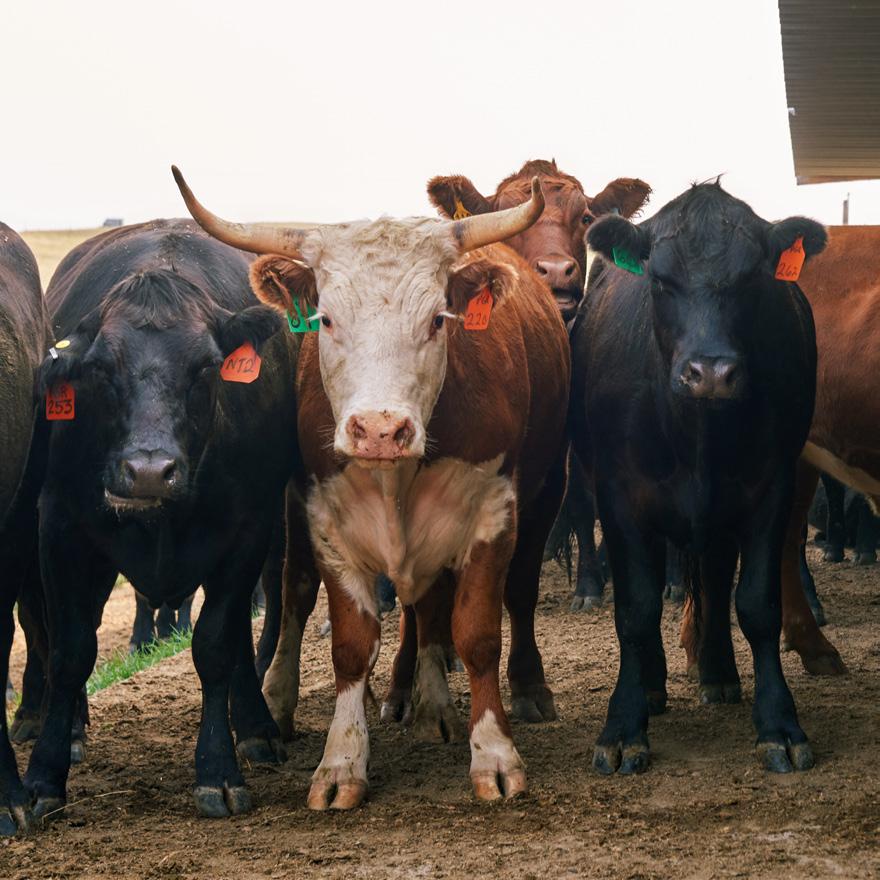
Mentoring provides Mihail with the opportunity to pass on knowledge from his experiences to promote sustainable practices and help other new-to-organic ranchers avoid common mistakes.
Mihail sees a growing demand for sustainable products and is optimistic about organic and regenerative beef. The value that organic certification brings to the ranch provides a premium for the product. His focus on soil health, biodiversity, and rotational grazing has boosted productivity while meeting market trends. “Organic keeps your mind fresh,” he says, highlighting the continuous learning involved.
B Bar Ranch embodies organic values, improving land health, wildlife diversity, and resilience through sustainable, naturedriven methods.


Lyle and Katie McDonald run Little Elks Ranch, a 78-acre farm near Summerville, Oregon, where they grow elderberries, maintain clover and alfalfa pastures, and produce certified organic hardneck garlic. The family has been farming for nearly a decade and achieved organic certification in 2019.
Though Lyle’s ancestors farmed in the Philippines for generations on his mother’s side, he grew up without direct ties to agriculture as a first-generation American. After serving in the Marine Corps, Lyle pursued a degree at Cal Poly Pomona through the GI Bill, where he discovered organic farming as a viable path to the livelihood he envisioned.
For Lyle and Katie, organic farming is deeply personal. “It aligns with our beliefs about how things naturally grow and the importance of knowing what goes into our food,” Katie explained. “It’s also about controlling what goes into the soil—whether it’s manure, fish emulsion, or other organic materials.” Safety was another key factor. Lyle and Katie wanted to protect their three daughters and pets from exposure to synthetic pesticides and chemicals.
Lyle signed up as a mentor for the Transition to Organic Partnership Program (TOPP) upon discovery. “It’s our opportunity to at least give back and help someone else who was in our shoes and get them three years ahead of where they would be, save them the money, save them the mistakes, the heartache and the stress on their marriage and the stress on their family,” said Lyle.
Through the TOPP mentorship program, Lyle was paired with mentee Keith Parkins, who, along with his wife Danita, runs Rimrock Springs in Ritter, Oregon. The Parkins farm 400 acres, raising livestock, poultry, and pork, with plans to plant garlic in the fall. As new farmers with two years of experience, they are committed to organic practices for the health benefits and their goal of leaving the land better than they found it.

Having a mentor has saved the Parkins time and money. “It’s free, really good advice. You always have stuff that you don’t see or that you don’t know and so to be able to not waste time or money the safety net is huge.”
“For me working with Keith has been awesome,” Lyle says. When Lyle and Katie were starting out they wished they had someone to go to for answers and advice. They are happy to be able to give back through mentorship.
“I literally feel like I can call Lyle at any time and no question is too ambiguous or ridiculous or whatever, because there’s so many different little nuances to everything being organic or just farming in and of itself, and I really do feel like I get trusted advice,” said Keith.

“Farmers—especially small and family farmers— always get a warm reception on Capitol Hill, and our stories and concerns are taken seriously there,” Pryor notes. “All of us should reach out to our elected representatives about current issues facing organic agriculture. More of us need to meet with them in person, whether in our hometowns or Washington, D.C.”

In August 2023, Pryor hosted staff from Congresswoman Andrea Salinas’s office at his farm to discuss key issues affecting his certified organic operation. As a member of the House Agriculture Committee, Representative Salinas is positioned to influence policies critical to organic farmers, such as organic research funding, climate resilience practices, and USDA organic regulation improvements.
At Oregon Tilth, we believe that advocating for a brighter food future starts with amplifying the voices of producers.
Our approach is grounded in connecting legislators, agency administrators, and decision-makers directly with farmers and ranchers, like Pryor Garnett of Garnetts Red Prairie Farm. Pryor is deeply committed to advancing policies that support organic farmers and regularly engages in advocacy to shape meaningful change.
Garnetts Red Prairie Farm, located in the rolling hills of Oregon’s Willamette Valley near Sheridan, spans 92 acres and has been certified organic by Oregon Tilth since 2016. The farm grows certified organic wheat and other small grains for food, fermentation, and feed, specializing in Yamhill wheat, a soft white variety ideal for pastries, cakes, cookies, and crackers. The property also includes 20 acres of Oregon White Oak woodland and extensive hedgerows that provide valuable habitat for wildlife and pollinators.
Pryor highlighted the impact of USDA conservation programs, his soil health practices, and the importance of local supply chains during the visit.
The farm tour led to an invitation from Congresswoman Salinas’s office for Pryor to participate in the House Sustainable Energy and Environment Coalition agriculture roundtable in January 2024. Pryor spoke on organic farming, conservation practices, and climate resilience, reinforcing the themes he discussed during the farm tour.
Pryor continued his advocacy in March 2024 in Washington, D.C., meeting with members of Oregon’s Congressional delegation as part of the Organic Farmers Association Advocacy Day. Alongside other organic farmers, he shared experiences that will help shape federal programs and the upcoming Farm Bill.
We are grateful to farmers like Pryor who invest their time in building relationships with elected officials and advocating for programs and policies that support sustainable farming and food production.



















































































At Oregon Tilth, data plays a pivotal role in driving forward our mission to support biologically sound and socially equitable agriculture. As our IT Director, Heather Smith, emphasizes, “Data is more than just numbers on a screen; it’s the narrative that connects our work with tangible results, informing decisions that directly impact both our operations and the wider organic agriculture community.”
Our data strategy is aligned with our organizational goals, enhancing transparency and fostering trust. Heather highlights the critical role that data visualization plays, transforming complex information into actionable insights. By leveraging these tools, Oregon Tilth communicates its progress and impacts more effectively, helping both internal teams and external stakeholders make informed decisions.
“When stakeholders can see the direct connection between our work and its impact on soil health or the livelihoods of organic farmers, it becomes a powerful tool for engagement.”
One of the key successes in fostering a data-driven culture has been the development of custom dashboards that allow real-time tracking of key metrics. Heather explains how these dashboards have enhanced service delivery, such as improving the timeliness of reviews, inspections, and client support. This focus on continuous improvement not only benefits our clients but empowers staff by providing clearer, more accessible data to guide their work.
In shaping the future of organic agriculture, Heather underscores the importance of data security and privacy. By adhering to industry best practices, Oregon Tilth ensures that sensitive information is protected while still maximizing the value of its data.

“Safeguarding our data is foundational to maintaining trust with our clients and stakeholders, and it allows us to confidently share highlevel insights that drive our mission forward.”
Looking ahead, Heather is excited about the possibilities that advanced technologies like artificial intelligence could offer, but she is clear that the foundation lies in ensuring data quality. With accurate, reliable data, Oregon Tilth is well-positioned to continue shaping a more sustainable and equitable food system through informed decision-making.
“Data tells the story of our past, measures our present, and guides the path to our future.” - Heather Smith, IT Director at Oregon Tilth


Kipori Woods
Oregon Tilth Ambassador
Oregon Tilth Ambassador
Class of 2024

Inspired by his uncle’s backyard garden, Woods dreams of owning a farm to create a sustainable future for his community. “I believe we are here to create, and farming is one of the most powerful forms of creation,” he says. For Woods, organic farming is about more than cultivating crops—it’s about building a thriving community.
The partnership with Paul Quinn College provided students like Kipori Woods with invaluable hands-on experience in sustainable agriculture and organic advocacy. Through this collaboration, Oregon Tilth equipped students with essential skills and knowledge to lead in the organic movement.
This year, Oregon Tilth partnered with Paul Quinn College, a Dallas-based Historically Black College, to empower the next generation of organic leaders.
This collaboration aligns with our mission to advance sustainable agriculture, champion organic food systems, and create pathways for new voices in the organic community. At the forefront of this partnership is Kipori Woods, an honors sophomore studying Business Administration, who exemplifies the spirit and potential of this initiative.
Through Paul Quinn’s innovative work program, Woods became the first student ambassador for the Oregon Tilth partnership. His personal interest in holistic healing and healthy eating evolved into a deep commitment to organic agriculture, fueled by the mentorship of Edward Johnson, Oregon Tilth’s Communications and Marketing Director, and other staff. “Oregon Tilth stood out to me because of my growing passion for organic foods and herbalism,” Woods shares. “Working under Mr. Johnson, I learned strategic ways of getting effective work done through collaboration and storytelling.”
Kipori worked closely with the Communications, Marketing, and Applicant Experience teams, where he gained a deeper understanding of how data storytelling can drive meaningful change in the organic sector. His contributions included supporting marketing strategy sessions, conducting client research, and analyzing data to enhance Oregon Tilth’s outreach and advocacy efforts.
As Woods says, “The greatest wealth is health,” a sentiment that drives his work and reflects the shared mission of both institutions to nurture young talent and create lasting impact.
Oregon Tilth is honored to support Kipori Woods and other aspiring leaders at Paul Quinn College as they pave the way for a healthier, more sustainable future.
Together, we are growing the next generation of leaders who will carry forward the legacy of organic agriculture.
Leading the Next 50 Years of Organic Innovation


Oregon Tilth Board of Directors and Executive Leadership join Paul Quinn College students to tour the WE Over Me Farm in Dallas, Texas.
As we close this chapter of our Impact Report and look towards the future, I am filled with excitement for what lies ahead. Oregon Tilth continues to evolve its leadership, innovation, and collaboration within the organic sector, not only influencing agricultural practices but also fostering growth across education, technology, and culture. Our success over the next 50 years will be built on this strong foundation.
Our vision moving forward is centered on a brighter future for all, which means embracing technology and data to drive decisions and expanding our reach through education. We have already seen our educational programs grow exponentially, engaging diverse communities and sparking curiosity that leads to opportunity. In this evolving landscape, partnerships remain crucial, and our ability to collaborate across sectors and with new, diverse partners will define our ability to innovate.
We must also ensure that our internal processes and talent are primed for growth. Efficiency starts with our people. Oregon Tilth’s strength lies in the skills and dedication of our team, and we will continue to focus on creating cross-training opportunities and leveraging the diverse talents of every individual. This ensures that as we grow, we remain adaptable and ready for the challenges ahead.
Our partnerships—both within the agricultural community and beyond—are crucial. Initiatives like our collaboration with Paul Quinn College reflect our commitment to fostering diversity and providing access to opportunities. These partnerships are not only about growing our organization but about creating lasting impact for the planet and its people. We believe that the solutions to the challenges of climate change and sustainability lie in organic practices, and we will continue to build bridges with those who share this vision.
As we reflect on Oregon Tilth’s journey over the past 50 years, our people are our greatest asset. Cultivating and retaining talent is about empowering our team members to grow within the organization and see their contributions as vital to the bigger picture. It is this shared sense of ownership and purpose that will carry us forward.
Looking ahead, we remain focused on building a community where everyone—regardless of background—has access to the benefits of organic practices. Whether through certification, education, or advocacy, we aim to create a more inclusive and accessible organic sector that serves both producers and consumers alike.

Leonard Freeman, Jr. COO

In 2023, Oregon Tilth demonstrated its resilience and commitment to advancing organic agriculture by achieving $11.58 million in total revenue. Domestic certification services remained the core of operations, generating 83% of revenue, while Latin America certification added 6%, reflecting the organization’s expanding global footprint. Oregon Tilth also successfully diversified its funding, with 9% coming from new grants, donations, and sponsorships, ensuring continued support for organic advocacy and educational initiatives.
Key investments in initiatives like Strengthening Organic Enforcement (SOE) and the Northwest Transition to Organic Partnership Program (NW TOPP) underscored the organization’s dedication to maintaining organic integrity and supporting transitioning producers. To meet these growing demands, Oregon Tilth strategically expanded its team by 20%, adding 19 staff members, and made critical IT infrastructure improvements to ensure efficient program execution and sustainability.
Expenses remained mission-aligned, with 74% devoted to certification services and 12% to education, advocacy, and outreach. With $12.5 million in total assets and sound fiscal management, Oregon Tilth remains well-positioned to meet the future challenges of the organic industry, fostering sustainable, equitable agriculture for the next generation.
CONSOLIDATED STATEMENTS OF OPERATIONS (audited)


